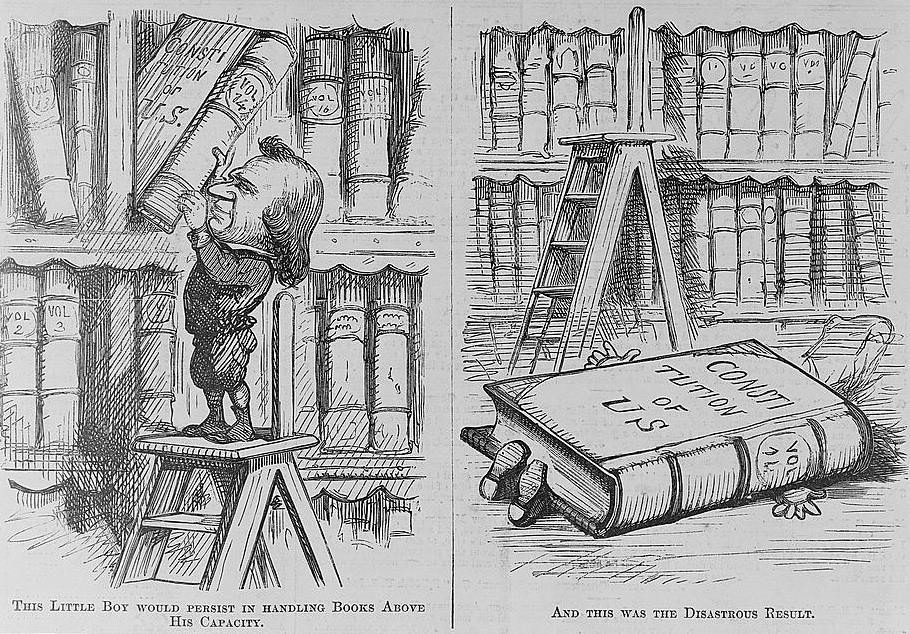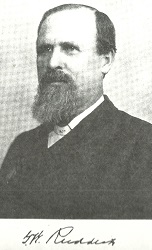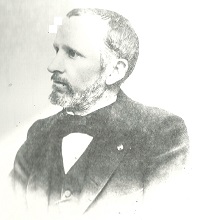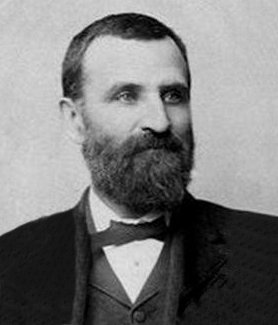Excerpted from The Courts and Legal Profession of Iowa

Cerro Gordo county was organized August 7, 1855, and John B. Long was elected county judge, Henry M. Clark, clerk, and C. B. Raymond, prosecuting attorney. The first case to come before the county court was entitled John N. Bill vs. George W. Henderson, a petition for habeas corpus. The attorneys are stated as being "Harwood and Penn Broker" (Poindexter). The court decided that from a technicality it had no jurisdiction over the case. This was September 18, 1856. In November, 1856, J. S. Church succeeded J. B. Long as county judge. He was a much better penman than Long, and the records greatly improved when his administration began.
On February 1, 1858, court convened at Mason City, but immediately adjourned to Livonia. In January, 1860, George Vemirlya succeeded J. S. Church as county judge. In 1859 an act was passed by the general assembly creating a board of supervisors to supersede the old system of county court, and was vested with nearly all the authority formerly held by that body. This act did away (practically) with the county judge.
One of the most important acts of that body at that time was the securing the legal services of W. P. Hepburn in settling the vexed question of Cerro Gordo county swamp land scrip with the United States land office at Washington, D.C.
Marcus Tuttle, Elisha Randall, W. E. Thompson and Geo. E. Frost are mentioned as county judges. When Cerro Gordo county was organized it became a part of the Tenth judicial district, which was created about the same time. The district was then comprised of Cerro Gordo, Allamakee, Chickasaw, Clayton, Fayette, Floyd, Howard, Mitchell, Winneshiek and Worth counties. These, with the exception of Cerro Gordo and Worth, and the addition of Bremer and Butler, became the Tenth judicial district in 1858. Samuel Murdock was the first judge of the Tenth district, elected April 2, 1855, and commissioned May 3, 1855. The first term held in Cerro Gordo county was in June, 1857, and was presided over by Hon. Samuel Murdock, judge of the Tenth judicial district. There were present, besides the judges, N. W. Stackhouse, sheriff, and E. D. Huntley, clerk of court.
The first case upon the docket was that of Silas Card and Jacob Van Curen vs. John B. Long, County Judge, for malfeasance in office. The case had been tried before the district court of Floyd county, and J.B. Long had been suspended from performing the duties of his office as county judge. The case was continued, however, coming before the district court of Cerro Gordo county, as stated above. On the first day of the term this case came up for hearing, and, a jury being demanded, the jurors named took their places. The parties appeared by their attorneys and, after hearing the proofs and allegations, arguments of counsel and charges of the court, the jury retired to consider their verdict. After a short absence the jury returned to inform the court of their inability to agree. The court then ordered the case continues, and also ordered, that defendant be reinstated in his office as county judge, and that the order suspending said party be annulled. At the same term of court, John Porter was regularly admitted to practice as an attorney and counselor at law in all district courts of the state.
Hon. Samuel Murdock was born near Pittsburg, Pennsylvania, March 17, 1817, moved to Ohio with his father when eleven years old and settled on a farm near Cleveland. He attended school about one-fourth of a year and balance of time helped his father on the farm. In 1841 he emigrated to Iowa. In the autumn of that year he was in the office of Hon. Gilman Folsom, Iowa City, where he remained until he was admitted to the bar in the spring of 1843. He immediately moved to Garnavillo, Clayton county, and began practice, being the first lawyer in that county. In March, 1876, he removed to Elkader, Clayton county. He was a man of education and refinement and had the reputation throughout the state of being an able lawyer and a sound jurist. Under the constitution adopted in 1857, Cerro Gordo county became a part of the Eleventh judicial district.Transcriber's Note: Hon. Samuel Murdock, Jr. died January 26, 1897. He was interred at Garnavillo Cemetery, Garnavillo, Iowa.
John Porter was elected judge of this district in October, 1858, and re-elected in 1862. He resigned before the expiration of his second term, and was succeeded by D.D. Chase, of Hamilton county. Judge Chase, however, never held a term of court in Cerro Gordo county, as another change was made in the district before he took the bench, which threw this county out of his district. William P. Hepburn and D.D. Chase were district attorneys while John Porter was judge. On the 4th of July, 1864, the Twelfth district was created, and Cerro Gordo county was made a part of that district. On the 8th of November, 1864, William B. Fairfield, of Floyd county, was elected district judge and John E. Burke of Waverly, district attorney. Judge Fairfield was re-elected in 1868, and I. W. Card, of Mason City, was elected district attorney. In 1870 Judge Fairfield resigned and George W. Ruddick, of Waverly, was elected to fill the vacancy.
William B. Fairfield was a native of New York, but came west early in the history of Iowa, and settled in Floyd county, where he engaged in the practice of law. He assumed duties as judge of the Twelfth District in 1864 and resigned his position as judge in 1870, and went into the banking business at Charles City, where he died.
 In the fall of 1870, George William Ruddick, of Waverly, was elected in the fall of 1870 judge of the Twelfth judicial district, to fill the vacancy, caused by the resignation of Judge Fairfield. Judge Ruddick was re-elected several times to the bench. He was born in Sullivan county, New York, May 13, 1835. Until fourteen years of age, he remained at home upon his father's farm, his time being spent alternatively at work and in attendance at the district school. On leaving home he went to Chester, Ohio, where he attended a seminary one year. Then he went to Kingsville, Ohio, for two years, then removed to Monticello, New York. After remaining there one year, he entered the law office of A.C. Niven, reading law with him for two and one-half years. In the fall of 1855, he entered Albany Law School, graduating in April, 1856. He was then admitted to the bar. In July, 1856, he started west, and on August 18, the same year, he arrived at Waverly, Bremer county, Iowa. He at once entered upon the practice of his profession, and made Waverly his home up to the time of his death [December 12, 1905, interment at Harlington Cemetery, Waverly, Iowa]. Judge Ruddick was a man of fine legal ability, with a thorough knowledge and understanding of the law, and made an acceptable judge. Supplemental Information: Pp. 500-02.
In the fall of 1870, George William Ruddick, of Waverly, was elected in the fall of 1870 judge of the Twelfth judicial district, to fill the vacancy, caused by the resignation of Judge Fairfield. Judge Ruddick was re-elected several times to the bench. He was born in Sullivan county, New York, May 13, 1835. Until fourteen years of age, he remained at home upon his father's farm, his time being spent alternatively at work and in attendance at the district school. On leaving home he went to Chester, Ohio, where he attended a seminary one year. Then he went to Kingsville, Ohio, for two years, then removed to Monticello, New York. After remaining there one year, he entered the law office of A.C. Niven, reading law with him for two and one-half years. In the fall of 1855, he entered Albany Law School, graduating in April, 1856. He was then admitted to the bar. In July, 1856, he started west, and on August 18, the same year, he arrived at Waverly, Bremer county, Iowa. He at once entered upon the practice of his profession, and made Waverly his home up to the time of his death [December 12, 1905, interment at Harlington Cemetery, Waverly, Iowa]. Judge Ruddick was a man of fine legal ability, with a thorough knowledge and understanding of the law, and made an acceptable judge. Supplemental Information: Pp. 500-02.
 Hon. H. N. [Harvey Nelson] Brockway, a native of Michigan, but he acquired his education largely in the public schools of Indiana and in a course in the South Bend Academy. He then came to Iowa where he studied law in Webster City and in 1860 was admitted to the bar and began the practice in Hancock county, where he has continued to reside to practice law, engaging also at times in collateral business. After continuing a very limited practice for about two years, he enlisted in the Thirty-second Iowa Infantry and served therein for three years as a private, sergeant, orderly sergeant and captain. His army service was faithful and honorable. He then returned to Hancock county and after serving a term as county treasurer, he resumed the practice of his profession and has continuously until within the last few years, pursued an active and successful practice uniting therewith the business of real estate and other practically allied business. Mr. Brockway has always had recognition as a faithful and competent lawyer and a man of thorough honest and abiding integrity. He was the first circuit judge of the Second circuit. He was elected in November, 1868, and served four years, at the expiration of which time Cerro Gordo county was thrown under the jurisdiction of the First circuit, and later they were consolidated. The first term of the Cerro Gordo county circuit court convened Feb. 8, 1869, in the court house at Mason City. Those present were: H.N. Brockway, judge of the Second circuit, Twelfth judicial district; F.M. Rogers, clerk, and A.M. Thompson, sheriff. The first case called from the docket was Rebecca Stahley against John Keller. W.C. Stanbery was counsel for the defendant.
Hon. H. N. [Harvey Nelson] Brockway, a native of Michigan, but he acquired his education largely in the public schools of Indiana and in a course in the South Bend Academy. He then came to Iowa where he studied law in Webster City and in 1860 was admitted to the bar and began the practice in Hancock county, where he has continued to reside to practice law, engaging also at times in collateral business. After continuing a very limited practice for about two years, he enlisted in the Thirty-second Iowa Infantry and served therein for three years as a private, sergeant, orderly sergeant and captain. His army service was faithful and honorable. He then returned to Hancock county and after serving a term as county treasurer, he resumed the practice of his profession and has continuously until within the last few years, pursued an active and successful practice uniting therewith the business of real estate and other practically allied business. Mr. Brockway has always had recognition as a faithful and competent lawyer and a man of thorough honest and abiding integrity. He was the first circuit judge of the Second circuit. He was elected in November, 1868, and served four years, at the expiration of which time Cerro Gordo county was thrown under the jurisdiction of the First circuit, and later they were consolidated. The first term of the Cerro Gordo county circuit court convened Feb. 8, 1869, in the court house at Mason City. Those present were: H.N. Brockway, judge of the Second circuit, Twelfth judicial district; F.M. Rogers, clerk, and A.M. Thompson, sheriff. The first case called from the docket was Rebecca Stahley against John Keller. W.C. Stanbery was counsel for the defendant.
Transcriber's Note: H.N. Brockway was born in 1837. He served during the Civil War with Company B, 32nd Iowa Infantry. He died in 1906 and was interred at Concord (a.k.a. Garner) Cemetery, Hancock County. Supplemental information Pp. 383-4; Harvey Nelson Brockway obituary.
 Robert G. Reiniger succeeded H. N. Brockway to the circuit judgeship. He was re-elected several times as his own successor. He was born in Seneca county, Ohio, April 12, 1835, on a farm. He prepared for college at Tiffin, Ohio, near his home; entered Heidelberg College in that city, in 1853; pursued miscellaneous studies for three years, reading law at the same time, and was admitted to the bar at that place September, 1856. In March, 1857, he came west and located at Charles City. On October 10, 1879, he was commissioned circuit judge. As a jurist he was cautious, conscientious and candid; had his prejudices, like other men, but laid them aside on the bench, and was impartial in his decisions.
Robert G. Reiniger succeeded H. N. Brockway to the circuit judgeship. He was re-elected several times as his own successor. He was born in Seneca county, Ohio, April 12, 1835, on a farm. He prepared for college at Tiffin, Ohio, near his home; entered Heidelberg College in that city, in 1853; pursued miscellaneous studies for three years, reading law at the same time, and was admitted to the bar at that place September, 1856. In March, 1857, he came west and located at Charles City. On October 10, 1879, he was commissioned circuit judge. As a jurist he was cautious, conscientious and candid; had his prejudices, like other men, but laid them aside on the bench, and was impartial in his decisions.
Transcriber's note: Robert G. Reiniger enlisted in Co. B., 7th Iowa Volunteers in 1861, and saw action in the battles of Belmont, Forts Henry and Donelson, Shiloh, Corinth, Luka and was in the campaign against Atlanta, attaining the rank of Captain. He was elected to the Iowa State Senate, serving in the Twenty-first, Twenty-second, Twenty-third and Twenty-fourth General Assemblies. Hon. Reiniger died October 15, 1910 and was interred at Riverside Cemetery, Charles City, Iowa.
The first lawyer to locate in Cerro Gordo county was Thomas Drummond, of Virginia, but he came here from Vinton [Iowa] in 1855.
Also From This Book
Source: Excerpts. Hon. Chester C. Cole, Historian; Hon. E. C. Ebersole, Editor. The Courts and Legal Profession of Iowa. H. C. Cooper, Jr., & Company. Chicago, Ill. 1907.
Transcribed by Sharon R. Becker (Nov 2017).